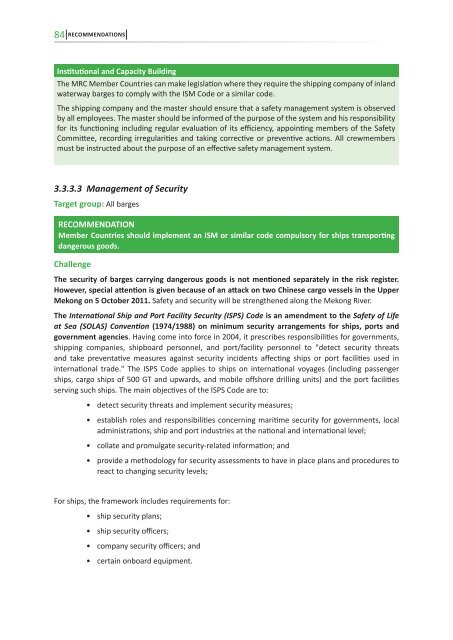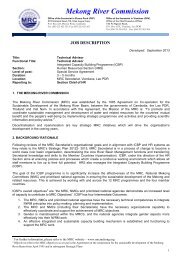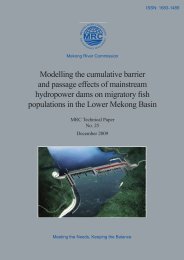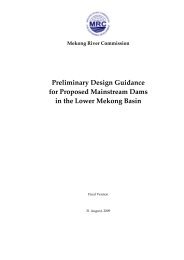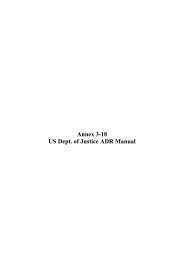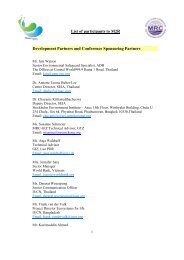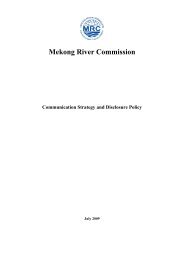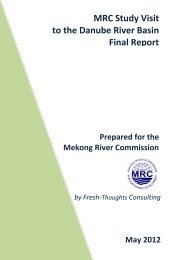Carriage, Handling and Storage of Dangerous Goods along
Carriage, Handling and Storage of Dangerous Goods along
Carriage, Handling and Storage of Dangerous Goods along
Create successful ePaper yourself
Turn your PDF publications into a flip-book with our unique Google optimized e-Paper software.
84 RECOMMENDATIONS<br />
Institutional <strong>and</strong> Capacity Building<br />
The MRC Member Countries can make legislation where they require the shipping company <strong>of</strong> inl<strong>and</strong><br />
waterway barges to comply with the ISM Code or a similar code.<br />
The shipping company <strong>and</strong> the master should ensure that a safety management system is observed<br />
by all employees. The master should be informed <strong>of</strong> the purpose <strong>of</strong> the system <strong>and</strong> his responsibility<br />
for its functioning including regular evaluation <strong>of</strong> its efficiency, appointing members <strong>of</strong> the Safety<br />
Committee, recording irregularities <strong>and</strong> taking corrective or preventive actions. All crewmembers<br />
must be instructed about the purpose <strong>of</strong> an effective safety management system.<br />
3.3.3.3 Management <strong>of</strong> Security<br />
Target group: All barges<br />
RECOMMENDATION<br />
Member Countries should implement an ISM or similar code compulsory for ships transporting<br />
dangerous goods.<br />
Challenge<br />
The security <strong>of</strong> barges carrying dangerous goods is not mentioned separately in the risk register.<br />
However, special attention is given because <strong>of</strong> an attack on two Chinese cargo vessels in the Upper<br />
Mekong on 5 October 2011. Safety <strong>and</strong> security will be strengthened <strong>along</strong> the Mekong River.<br />
The International Ship <strong>and</strong> Port Facility Security (ISPS) Code is an amendment to the Safety <strong>of</strong> Life<br />
at Sea (SOLAS) Convention (1974/1988) on minimum security arrangements for ships, ports <strong>and</strong><br />
government agencies. Having come into force in 2004, it prescribes responsibilities for governments,<br />
shipping companies, shipboard personnel, <strong>and</strong> port/facility personnel to "detect security threats<br />
<strong>and</strong> take preventative measures against security incidents affecting ships or port facilities used in<br />
international trade." The ISPS Code applies to ships on international voyages (including passenger<br />
ships, cargo ships <strong>of</strong> 500 GT <strong>and</strong> upwards, <strong>and</strong> mobile <strong>of</strong>fshore drilling units) <strong>and</strong> the port facilities<br />
serving such ships. The main objectives <strong>of</strong> the ISPS Code are to:<br />
• detect security threats <strong>and</strong> implement security measures;<br />
• establish roles <strong>and</strong> responsibilities concerning maritime security for governments, local<br />
administrations, ship <strong>and</strong> port industries at the national <strong>and</strong> international level;<br />
• collate <strong>and</strong> promulgate security-related information; <strong>and</strong><br />
• provide a methodology for security assessments to have in place plans <strong>and</strong> procedures to<br />
react to changing security levels;<br />
For ships, the framework includes requirements for:<br />
• ship security plans;<br />
• ship security <strong>of</strong>ficers;<br />
• company security <strong>of</strong>ficers; <strong>and</strong><br />
• certain onboard equipment.


